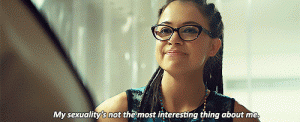 The TV show, Orphan Black, utilizes several of the “clones” on the show to break down binaries. I would like to focus on one clone in particular. On the show, one of the clones Cosima, has several relationships with women, however, she never expressly defines her sexuality until Season 3. Aside from this, what is so great about her character is that she lives by statements like the one above. When asked if she was gay, she states that this is not the most interesting thing about her. Instead, she strives to save all of the other clones through her scientific genius. She dates other women, but this is perceived in a very normal and matter-of-fact way. In addition, one of the women she dates identifies as straight, however, when she fell in love with Cosima, she did not question or run from her feelings. Cosima is one of the most powerful LGBT characters on television in present day, for her sexuality is not what makes her interesting or important. Her worth comes from charm, wit, humor, and brilliance. Rather than view and portray this character as a “token character” or a “novelty,” her character is depicted as “normal.” Like queer time, this television shows strives to break down the walls of what is “normal” and what is “abnormal.” Cosima is a woman with brown hair and glasses who likes science and women, just as another clone has brown hair and likes leather jackets and punk rock, just as another close is transgender. Despite their differences, Orphan Black views each of these characters, their lives, and their relationships the same. If society was capable of viewing all individuals the same, just as this show does, than there would be no need for “queer time.”
The TV show, Orphan Black, utilizes several of the “clones” on the show to break down binaries. I would like to focus on one clone in particular. On the show, one of the clones Cosima, has several relationships with women, however, she never expressly defines her sexuality until Season 3. Aside from this, what is so great about her character is that she lives by statements like the one above. When asked if she was gay, she states that this is not the most interesting thing about her. Instead, she strives to save all of the other clones through her scientific genius. She dates other women, but this is perceived in a very normal and matter-of-fact way. In addition, one of the women she dates identifies as straight, however, when she fell in love with Cosima, she did not question or run from her feelings. Cosima is one of the most powerful LGBT characters on television in present day, for her sexuality is not what makes her interesting or important. Her worth comes from charm, wit, humor, and brilliance. Rather than view and portray this character as a “token character” or a “novelty,” her character is depicted as “normal.” Like queer time, this television shows strives to break down the walls of what is “normal” and what is “abnormal.” Cosima is a woman with brown hair and glasses who likes science and women, just as another clone has brown hair and likes leather jackets and punk rock, just as another close is transgender. Despite their differences, Orphan Black views each of these characters, their lives, and their relationships the same. If society was capable of viewing all individuals the same, just as this show does, than there would be no need for “queer time.”
P.S Orphan Black passes the Bechdel Test.
While I haven’t seen the show, I know it’s about a bunch of clones who didn’t know they were clones and they all ended up differently despite being biologically identical. It’s interesting to think about this as queering relationships, since the only thing remotely close to this kind of situation in the “real world” is identical twins/triplets/etc. Are these relationships similar to normative sibling relationships? Do they closely resemble the relationships between identical womb-mates? How is this complicated by the fact that they are not “naturally” conceived? This is yet another example of how SciFi can be used to tell various queer narratives.
I kept wondering the gender of the narraotor when I was reading the book. But your nice example of Orphan Black tells me how I was narrow minded. The possibility of world where your gender does not matter but only your own charm matters, it’s interesting and worth giving it a thought.